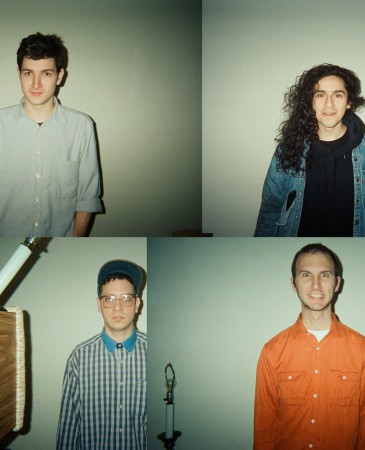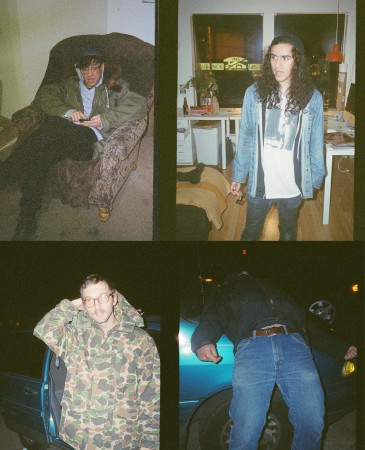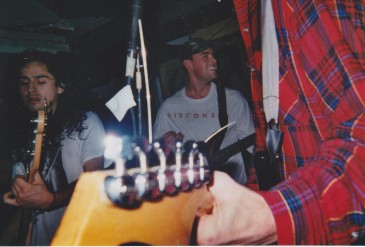
A year ago, interviewing Weed would have meant a one-on-one with Will Anderson and his tape deck, when the name was applied to his d.i.y. solo cassettes. Today, he’s flanked by Kevin Doherty (second guitar), Hugo Noriega (bass) and Bobby Siadat (drums), who have melded Weed into an epic lo-fi, guitar-sludge quartet. Anderson couldn’t be happier about the change.
I’m catching them at Budgie’s Burritos as they prepare to release their new EP, Gun Control, next month. The excitement of going on tour to support it is bursting from their collective seams, and the conversation is a reminder that underneath the grabby moniker is a band with serious ethos.
Discorder: This will be the second record you’ve pressed to vinyl as opposed to releasing on tape.
Will Anderson: Yeah, With Drug/Eighty was the first. We self-released it. I came up with this dumb phrase, “Cruising USA” and I decided that’s a record label. CUS-02 is With Drug/Eighty, Gun Control will be CUS-03.
D: You toured for With Drug/Eighty through the west coast and the mid-west, and you are touring for this release all the way to the east coast. Not many bands here do that. Why are you doing it where others aren’t?
WA: I have to ask why other bands don’t tour.
Hugo Noriega: It’s scary playing outside of your town. Locally, all bands have connections.
D: What was your connection to the cities you’ve toured to, like Portland or Seattle?
WA: We didn’t have any. Our first show in Seattle was a disaster. The first show in a new city is never good. There were three people there, but we met them and talked to them and they helped us get our next show there.
Bobby Siadat: We met a girl from Baltimore. We’re going through there but we didn’t have anything scheduled. She knew all these people and places to play.
WA: A big point for us is traveling. That’s what it’s all about.
BS: Being on the road is super sweet. It’s the best way to travel. I couldn’t see a more fun time, being together and traveling around. More bands need to get down with that.
Kevin Doherty: It’s an excuse to go places, and it’s an inherently social environment.
HN: We’ve got rules for interactions, though. Like, don’t talk to Will after shows sometimes. Just leave him alone.
WA: Especially when we play with bands that I really respect, I just feel unworthy. And I just like to go into the van and sit by myself for a bit.
HN: One time, in Olympia, after a show in an old youth insane asylum, Will didn’t talk to anyone for three hours.

D: There’s a significantly different sound in your older tapes than on the two new records you’ve released on vinyl. Why is that?
WA: Before those, it was just solo experimentation. It was about me getting something on tape, I didn’t know what I was doing. Still don’t, really.
How does it feel playing with a band after those releases?
WA: Way more satisfying. It’s what I really wanted in the first place. All my friends were in bands and I asked “why don’t they ask me to be in any bands?” and so, fuck it, I’ll do my own tape. What I really wanted was to have a band to go on tour with, and now we have that. There’ll be a day where I want to do more stuff by myself, but not for a long time.
D: Despite keeping the same name, do these new releases feel like they’re by the same band?
WA: No. I would have changed the name if I didn’t think it was the most brilliant name of all time. It’s totally different now.

D: You’ve got to be the least-Googleable band in history. Why “Weed?”
WA: Well, it’s easy to remember. It attracts a lot of attention, for sure. The word weed, when you say it out loud you think of one thing. But it can mean to weed something out of your life. It’s also something that won’t die, that’s resilient.
KD: I think we like the sensationalist aspect of it, too. It gets attention.
D: Weed records are incredibly lo-fi. Why?
KD: It’s more of a means thing. The last record sounded great, but we recorded it in Seattle.
WA: We knew this one was going to be a little hairier. We could have recorded in a studio again, but there was something important in having us do almost everything.
HN: It was a completely conscious decision. We wanted to do it ourselves.
KD: Chris Gilling [a friend of the band] recorded everything and did a lot of the mixing too, along with me. If my part was anything, it was to muck up the recordings a little. Chris got everything sounding crispy.
D: The list of venues you’ve played at is eclectic: cramped house shows, even more cramped art spaces, and the like. Is there a reason for that?
WA: We’ll only play shows open to minors. It forces us to be creative about where we play. There are a very limited amount of all-ages venues in town. I think that music is for everyone: it wasn’t that long ago that I couldn’t go to shows unless I had a fake ID. Like there’s a magic age where you can drink alcohol, so now you can enjoy music? I’m not trying to say our band is inspiring to kids or anything, but a lot of kids can be inspired by bands when they’re 15, 16 years old. It’s really convenient to just play bars—to tour the bars of America. We won’t do that.
Weed kicked off their tour at The Lion’s Den, May 3.

